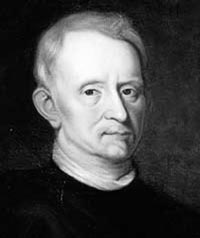
| Born: Jul 28 (O.S Jul 18), 1635 in Freshwater, Isle of Wight, England |
| Died: Mar 3, 1703 (at age 67) in London, England |
| Nationality: English |
| Famous For: Hooke’s law and Microscopy applied the word ‘cell’ |
He was a genius on the level of Isaac Newton, and some have called him “the Leonardo da Vinci of England,” but few people today remember the name of Robert Hooke. Yet, he was among the most brilliant physicists of all time.
Robert Hooke was a contemporary of the great Isaac Newton, and other luminaries of the mid 1600’s, such as Edmund Haley and the brilliant Robert Boyle. In fact, Hooke claimed that Newton stole some of his ideas about gravity, specifically the Inverse Square Law, which is among the greatest of all scientific achievements. He also made similar claims against other scientists of the day. Most agree in the case of Newton; however, that even if he was influenced by Hooke, it was Newton who deserved credit for the final formulation on gravity. Hooke did come close to explaining gravity on his own, however.
A Key Figure in Science
It is well known that Hooke and Newton exchanged a series of letters and communicated frequently. Hooke held the pivotal position of curator of experiments of the Royal Society, which was the most important and prestigious organization for science in England. At this post, Hooke was responsible for coordinating the great minds of England and setting the overall agenda for the ongoing advancement of knowledge.
Difficult Personality
Most historians agree that Robert Hooke was an extremely difficult person. He was disliked by many people. He was well known for his bitter attitude, jealousy of others and for being extremely unpleasant to be around. Other historians have recently disputed this, but evidence of Hooke’s dark personality is too pervasive to be set aside.
A Remarkable Mind
The most important thing about Robert Hooke, however, was his uncanny genius and his spectacular series of achievements across and astonishing array of fields. Hooke is described as a polymath because he excelled in a wide variety of disciplines, from astronomy and biology, to architecture, paleontology and even medicine.
Early Brilliance
Hooke was born into humble means in 1635 on the Isle of Wight in England. His father, John Hooke, was a priest in the Church of England. The young Robert Hooke was expected to follow his father into a career in the ministry, but it was clear from an early age that this was an unusually intelligent child. For example, Hooke was obsessed with how mechanisms worked. He was known to take apart items like clocks and pumps. As a child he built a sophisticated version of a brass clock using only wood. Upon his father’s death, Hooke inherited 40 pounds which enabled him to buy an apprenticeship to a watchmaker. Yet, his obvious brilliance eventually landed him admission at Westminster School in London. There Robert Hooke’s restless, brilliant mind impressed everyone. He learned languages, such as Latin, Greek and Hebrew with ease. He excelled in mathematics and displayed brilliance in connection with any subject matter he confronted. He also was in a constant state of drawing designs and building inventions.
Major Achievements
Robert Hooke published an enormous amount of work, including a book about microscopes and telescopes called Micrographia. It detailed his 30 years of study with microscopes and was the first ever book published by the Royal Society. Micrographia is a work of monumental importance which advanced the study of biology in a way that could never be overestimated. It is unfortunate that Robert Hooke’s abrasive personality and his penchant for making enemies caused his reputation to suffer, thus causing his place in history to rapidly decline. It is believed the only known portrait of Hooke was destroyed by one of his detractors.
However, the importance of what Robert Hooke contributed to science and to the advancement of the knowledge of the human race is beyond measure.